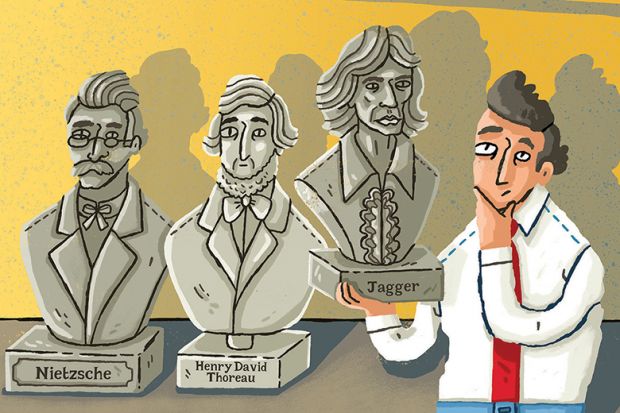A young Mick Jagger couldn’t get no satisfaction, and on the cusp of his middle age he was desperate “to do some living before we die”. If the dominant mood of the young is angst, for those over 40 it is regret.
That is certainly true for me. As a middle-aged university lecturer, I am less likely to look forward to what might be than I am to look back to what might have been. Maybe I should heed Nietzsche’s advice to love my fate and snub any regrets. This certainly chimes with the “you only live once” zeitgeist, but I am not convinced that the Nazis' philosopher of choice is a better life coach than Sir Mick.
Regret is inevitable as we accumulate experience, and, importantly, it informs future experience, too. If the unexamined life is not worth living, then neither is the unregretted life. As Henry David Thoreau put it: “To regret deeply is to live afresh.”
Of all my regrets, those that touch upon my professional life are the least important. Yet these are the ones that typically induce the greatest sense of self-disillusion – and that sense is a very underrated one in academia. After all, it provides us with a form of summative feedback regarding our relationship with the world, showing us how much we need to change. And although my biggest regrets in this category are personal, they also reflect ongoing conversations about the direction in which higher education is heading.
One regret is that I wish I had wasted less of my psychic bandwidth on worrying. Especially anxiety-inducing are those impending verdicts – on a submitted manuscript, or an application for a grant or promotion – that are potentially career- or even life-defining. And these crucial decisions are subject to the evaluative capacities of senior peers, many of whom are invariably overburdened by review requests.
But, as the Epicureans taught us, worry is just a matter of perception. Very often our loftiest ambitions are never fulfilled, but neither do our worst fears ever materialise. To perceive the future in a less threatening way, it is useful to remember that academic life is absurd. I should have kept that more closely to heart. And I should have appreciated better that fear can be used to control us. It is a chain around our necks.
I also wish I had been less competitively resentful. That is another feeling that is perhaps endemic to the academic professional: a product of a status anxiety. If a small part of us dies when a friend succeeds, our whole being is plunged into eternal darkness when that friend triumphs. Modern academia is now an intellectual version of the Hunger Games, characterised by survival of the fattest CV. But that doesn’t mean we have to barricade ourselves in our offices, bows and arrows at the ready. That is a bleak existence. I wish I had socialised more, and built camaraderie. I neglected that as unimportant. It’s not.
Relatedly, I wish I had developed academic collaborations a lot earlier. I have found working with other like-minded academics to be a great source of support and cheer. Co-authors have become not just research collaborators but co-conspirators against the trials of university life.
Another regret I have is that I wish I had read more – particularly more of the right things. Like most academics, I entered the profession to broaden my understanding of the world. Yet, like many of my peers, my pursuit of that goal was compromised by a failure to read in sufficient detail and depth. This is no longer a job in which you can kick back and make your way through In Search of Lost Time – for life is short, and Proust is long. You must focus on your academic silo. But, ironically, apparently pointless reading could improve our research, by steeping us in what French Jesuit thinker de Certeau calls the scriptural economy of intellectual life, as well as through exposing us to different forms of writing.
When surveyed about their biggest regrets, people will often say that they wish they had not spent so much time working. For me, however, my main regret is not the quantity of work I have done: in fact, I could have done with doing a bit more. Rather, my biggest disappointment relates to the type of work that has dominated my time – especially my time dedicated to scholarship.
Specifically, I wish I had taken more risks in my research. I wish I had followed my own intellectual agenda, rather than fruitlessly pursuing extrinsic targets. It is my failure to do so that leaves me most disillusioned about my profession and my decision to be an academic.
Perhaps that is all my own fault. Perhaps it all relates to my inability to rein in my anxiety. But my predicament is far from an unusual one. And it seems immensely sad that a profession that promises so much, in terms of personal interest and development, can deliver so little. But even though, like Sir Mick, you can’t always get what you want, if you try sometimes – and if you learn from your regrets – you just might find you get what you need.
Michael Marinetto is senior lecturer in public management at Cardiff Business School, Cardiff University.




